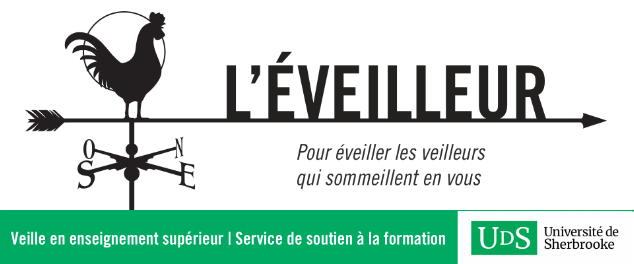Certains membres de la cellule de veille suivent les travaux de Cathy Davidson depuis plusieurs années. C’est pourquoi lorsqu’une opportunité s’est présenté de nous procurer son dernier livre, The New Education: How to Revolutionize the University to Prepare Students for a World in Flux (Basic Books, 2017, 319 p.), nous l’avons saisie. Voici un aperçu de la table des matières:
- Quarter-Life Crisis
- College for Everyone
- Against Technophobia
- Against Technophilia
- Palpable Impact
- Why College Costs So Much
- The Measure of a Student
- The Future of Learning
Néanmoins, avant même de débuter ma lecture de l’ouvrage, je trouve intéressant d’en faire une revue de presse sommaire pour savoir à quoi m’attendre. On y comprend que Davidson y fait l’apologie de l’apprentissage actif, y décrie tant les technophobes que les technophiles, s’insurge contre les départements disciplinaires et la préoccupation des institutions universitaires pour l’écrémage plutôt que pour la formation large pour le plus grand nombre. Elle s’inquiète des coûts astronomiques des études supérieures aux États-Unis et présente des portraits d’éducateurs innovants, tout en rappelant qu’ils sont l’exception plutôt que la norme.
“Far too many of those who seek quick, expensive technological fixes are simply automating 19th-century ideas of education as synonymous with outputs, production, specialization, content, assessment and credentialing,” Davidson said in an interview. “That’s wrongheaded. Learning, almost definitionally, is that which isn’t automatic. You learn any time you change, any time you are required to stop, think, revise an opinion or change a mental or physical habit.”
Learning, she said, “is about insight, application, paradigm shifts, failing, trying again and so forth. Learning cannot be automated. Cognitively, learning is the opposite of habit — the opposite of automation.”
At the same time, Davidson said, the new education requires colleges and universities to address all the changes that automation has wrought on the economy, politics and work.
[…]Students today, she says, “need so-called soft skills, including strategies, methods and tactics for successful communication and collaboration.” They need new ways of integrating knowledge, including by reflection on what they’re learning — not more “teaching to the test.” They need student-centered, active learning and to be encouraged to make public or professional contributions beyond the classroom.
Such skills, she adds, “are necessary to navigate a world in flux, where [students] cannot count on continuing for any length of time in the job or even in the field for which they were originally trained…
[…] …Davidson said what she’s advocating doesn’t just prepare one for a changing jobs landscape, but a “changing landscape” over all. Put another way, she said, institutions need to support students in learning skills “that will make them not just work-force ready but world ready.” (Flaherty, 2017, nos emphases)
Elle clôt l’ouvrage par 10 recommandations aux étudiants qui veulent profiter au maximum de leur expérience universitaire et 10 trucs pour transformer toute classe afin de favoriser l’apprentissage actif, centré sur l’étudiant. Les voici (sans les explications détaillées, mais ça donne une idée de ses chevaux de bataille):
Ten Tips for Getting the Most Out of Your College Experience
- Diversify
- Mitigate risk while taking risks
- Find a great prof and take advantage of all they offer
- Shop around for the right adviser – and use them. Often.
- Start an evolving, personal résumé as soon as you get to college and use it as your personal guide on your life path
- Make your major minor
- Form a study group
- Know when to find a tutor
- Learn beyond the classroom
- When it’s time to submit an actual, professional résumé, remember your first reader may be an algorithm
Ten Tips for Transforming Any Classroom for Active Student-Centered Learning
- Think-Pair-Share
- Question Stacking
- Everybody Raise Your Hand
- Interview
- Class Constitution
- Collective Syllabus Design
- Collaborative Note Taking
- Collaborative Projects with Peer Assessment
- Exit Tickets
- Public Contribution to Knowledge
Sources:
An Educator Makes the Case That Higher Learning Needs to Grow Up », The New York Times, 23 août 2017
Davidson, Cathy N., « More Or Less Technology In The Classroom? We’re Asking The Wrong Question » (extrait du livre), Fast Company, 7 septembre 2017
Flaherty, Colleen, « The New, New Education », Inside Higher Ed, 24 août 2017
Kamenetz, Anya, « Why One Educator Says It’s Time To Rethink Higher Education », nprEd, 13 septembre 2017






